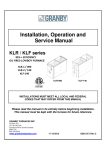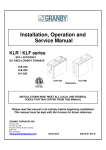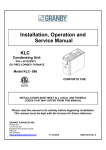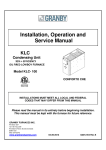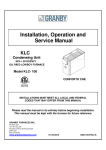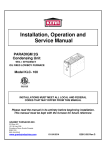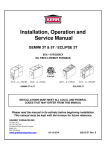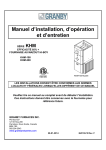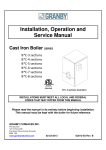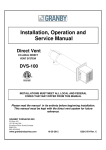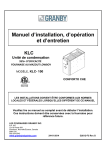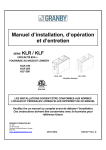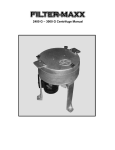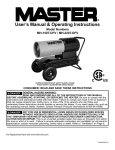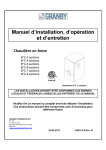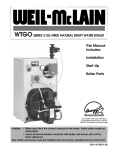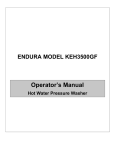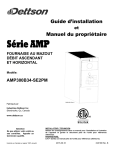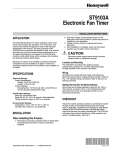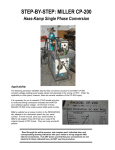Download KHM Series - Wolseley Canada Inc
Transcript
Installation, Operation and Service Manual KHM SERIES 85% + EFFICIENCY OIL FIRED HI-BOY FURNACE KHM-1 / 090 KHM-2 / 140 KHM-1 / 090 Illustration INSTALLATIONS MUST MEET ALL LOCAL AND FEDERAL CODES THAT MAY DIFFER FROM THIS MANUAL Please read the manual in its entirety before beginning installation. This manual must be kept with the furnace for future reference. GRANBY FURNACES INC. PO Box 637 12118 Hwy 209 Parrsboro Nova Scotia Canada B0M 1S0 902-254-2543 www.granbyindustries.com 11-09-2012 G2012-E2 Rev. C TABLE OF CONTENTS 1.0 IMPORTANT SAFETY ADVICE 2 2.0 PRODUCT INFORMATION 3 3.0 FURNACE INSTALLATION 6 4.0 ACCESSORY INSTALLATION 9 5.0 BURNER INSTALLATION AND SPECIFICATIONS 5.1 ASSEMBLY & INSTALLATION OF BURNER 5.2 SET BURNER FOR EFFICIENT OPERATION 5.3 TECHNICAL INFORMATION 13 13 14 16 6.0 FURNACE OPERATION AND SETTINGS 6.1 BLOWER SETTING 6.2 FAN TIMER CONTROL BOARD (ST9103 A 1028) 6.3 ST9103 A 1028 CONTROL BOARD SEQUENCE 6.4 SERVICING – FAN TIMER (ST9103 A 1028) 17 17 18 19 20 7.0 SERVICE 22 8.0 ELECTRICAL / WIRING DIAGRAMS RIELLO WIRING DIAGRAM BECKETT WIRING DIAGRAM 25 25 26 9.0 EXPLODED PARTS VIEW KHM-1 / 90 KHM-2 / 140 28 28 30 10. START-UP TEST RESULTS 32 1 1.0 IMPORTANT SAFETY ADVICE Please read and understand this manual before installing, operating or servicing the furnace. To ensure you have a clear understanding of the operating procedures of the appliance please take the time to read the IMPORTANT SAFETY ADVICE section of this manual. WARNINGS NEVER burn garbage or paper in the unit. NEVER store combustible material around it. DO NOT attempt to start burner when excess oil has accumulated, when unit is full of vapour or when heat exchanger is very hot. DO NOT use gasoline, crankcase drainings or any oil containing gasoline. CAUTION DO NOT START THE BURNER UNTIL ALL FITTINGS, COVERS AND DOORS ARE IN PLACE. DO NOT TAMPER WITH THE FURNACE OR CONTROLS, CALL A QUALIFIED BURNER TECHNICIAN. DO NOT STORE OR USE GASOLINE OR OTHER FLAMMABLE VAPOURS AND LIQUIDS IN THE VICINITY OF THIS UNIT OR ANY OTHER APPLIANCE. DANGER Do not use this furnace as a construction heater. Use of this furnace as a construction heater exposes it to abnormal conditions, contaminated combustion air and lack of air filtering. Failure to follow this warning can lead to premature furnace failure which could result in a fire hazard and/or bodily harm and/or materials damages. IMPORTANT This manual contains instructional and operational information for the KHM OIL-FIRED FURNACE. Read the instructions thoroughly before installing furnace or starting the burner. Consult local authorities about your local FIRE SAFETY REGULATIONS. All installations must be in accordance with local state or provincial codes. Improper installation will result in voiding of warranty. 2 2.0 PRODUCT INFORMATION CLEARANCE (minimum) TO COMBUSTIBLES UPFLOW POSITION Top & Sides of Supply Plenum 1” Front (Maintenance) 24” Rear 0” First Side 0” Other Side 0” Flue Pipe 9” Floor (25 mm) (610 mm) (0 mm) (0 mm) (0 mm) (229 mm) Combustible DOWNFLOW POSITION Top Bottom and Sides - Plenum Rear First Side Other Side Front (Maintenance) Flue Pipe Floor (with Down flow base) 2” 1” 0” 0” 0” 24” 9” (51 mm) (25 mm) (0 mm) (0 mm) (0 mm) (610 mm) (229 mm) Combustible HORIZONTAL POSITION Top Bottom and Sides - Plenum Rear First Side Other Side Front (Maintenance) Flue Pipe Floor 2” 1” 1” 1” 1” 24” 9” 2” (51 mm) (25 mm) (25 mm) (25 mm) (25 mm) (610 mm) (229 mm) (51 mm) DRAFT PRESSURE Breech draft pressure -0.01” wc minimum AIR/BLOWER DATA External static – Non A/C External static – A/C Maximum cooling Maximum air temperature rise High Limit, max design outlet temp Thermostat anticipator 0.2” wc 0.5” wc 3.0 tons… KHM-1 / 090 5.0 tons… KHM-2 /140 See page 16 and 33 185°F 0.2 amps MOTOR/BLOWER KHM-1 / 090: 1/2 hp 4 Speed / G10-8 DD or 1/2 hp ECM / G10-8 KHM-2 / 140: 3/4 hp 4 Speed / GT12-10DD or 3/4 hp ECM / GT12-10 3 FAN/HIGH LIMIT CONTROL Honeywell ST9103 Fan Center & Thermo-Disk (7” stem) DIMENSIONS (KHM-1 / 090) Depth 26” (660 mm) Height 46 1/4” (1175 mm) Width 21 7/16” (545 mm) DIMENSIONS (KHM-2 / 140) Depth 30” (762 mm) Height 49 7/8” (1267 mm) Width 21 7/16” (545 mm) PLENUM DIMENSIONS (KHM-1 / 090) Cold air return (A) 18” x 18” Hot air supply (B) 20” x 20” (457 x 457 mm) (508 x 508 mm) PLENUM DIMENSIONS (KHM-2 / 140) Cold air return (A) 23” x 18” Hot air supply (B) 24” x 20” (584 x 457 mm) (610 x 508 mm) AIR FILTERS KHM-1 / 090 KHM-2 / 140 20” x 20” x 2” non-pleated UL approved 25” x 20” x 2” non-pleated UL approved A/C COIL LOCATION Minimum height above the heat exchanger 6” (152 mm) See A/C Coil Manufactures Requirements SMOKE-PIPE CONNECTION 5” Chimney or direct vent DVS Granby kit CLEANOUTS Front Cover & Burner Opening THERMOSTAT Any thermostat FUEL Not heavier than No. 2 furnace oil. ELECTRICAL – 120 Volts, 60 Hz Canada Less than 12 amps. USA 13.3 amps, circuit protection 20 amps. 4 KHM-1 / 090 - DIMENSIONS Dimensions are in inches KHM-2 / 140 - DIMENSIONS Dimensions are in inches 5 3.0 FURNACE INSTALLATION OIL TANK & PIPING Tank installation must conform to local requirements. Install according to the applicable code such as CSA B139 and NFPA 31. Minimize the number of connections in suction line and make all connections as tight as possible. Use a pipe joint compound suitable for oil on all pipe threads. To reduce possibility of air leaks, tighten stem packing gland nut on any valves installed in the suction line. Also, be sure the oil filter is tight, as filter gaskets often shrink. Check for kinks in the oil lines as well as for possible air pockets and for loose connections. Two filters as shown below are recommended. Optional tank gauge protectors and outlet protectors are available at your local dealer. ONE PIPE SYSTEM Where the tank is above the burner and when the oil flows by gravity to the oil pump, a single-stage fuel unit with a single oil line to the pump may be used. TWO PIPES SYSTEM When a single line is unsuitable, use a double line system or see your dealer for special oil line fittings. Install by-pass plug on burner fuel unit as specified in the burner manual. Oil Tank and Piping 6 PLACEMENT & VENTING Furnace installation shall conform to the required installation code for oil-fired equipment (USA: NFPA 31, Canada: CSA B139). FLOOR SUPPORT COMBUSTIBLE – If required, support furnace on five (5) concrete blocks. Make sure the center of the furnace base is supported. Approved for installation on combustible floors in the upflow position and downflow position (with the optional sub-base). Not approved for installation on combustible floor in horizontal applications. For horizontal applications, use railing type support (not supplied) to keep the furnace in position. Make sure that all clearances are respected. CHIMNEY/VENT Connect the furnace to a chimney/vent system of size and condition required by the NFPA 31 (USA) or CSA B139 (Canada) code. Furnace is approved for factory built chimney type “L” vents. Breech is certified for 5” vent pipe. Keep vent/flue pipe as short as possible with a minimum upward slope of ¼’’ per foot. Vent/flue pipes MUST NOT pass through a ceiling. Maximum flue gas temperature is 575°F. CONDENSATION If you have condensation in your chimney, make sure that the chimney size is according to the tables in CSA B139 / NFPA 31. The temperature at the entrance of the chimney can be increased by insulating the flue-pipe between the furnace and the chimney base. If this is not sufficient, consider cutting or removing some flue baffles in the furnace. BE AWARE THAT REMOVING BAFFLES REDUCES THE UNIT EFFICIENCY AND A MODIFIED UNIT IS NO LONGER ENERGY STAR APPROVED. COMBUSTION & VENTILATION AIR Install openings and ductwork to the furnace room providing fresh outside combustion and circulation air for cooling the furnace casing, as installation code requires (USA NFPA 31, Canada CSA B139). If installed in a closed room, provide two free air ventilation openings of at least 8” x 12” (96 sq. in.) free flow area near ceiling and floor. Oil burners must have sufficient air to allow vent systems to operate properly. DRAFT Use approved draft control supplied for 5” pipe. minimum pressure of -0.01” wc. ELECTRICAL Wire according to the National Electrical Code (Canadian Electrical Code in Canada) or local codes. Use a separately fused #12 electrical line directly from the service panel to the furnace junction box. Install a manual shut-off switch at the door or stairway to furnace room so furnace can be shut off remotely. CLEARANCES Before placing unit, review installation clearances as shown on furnace operating decal or section PRODUCT INFORMATIONS. LOCATION Install the furnace close to chimney and central to ductwork. Set specified draft 7 MULTI-POSITION CONFIGURATIONS UPFLOW INSTALLATION DOWNFLOW INSTALLATION AIR RETURN Filter WARM AIR Filter Downflow Sub-base AIR RETURN WARM AIR The return air opening can be located on left side or on the right side of the unit. After installing the filter rack supplied with the unit we recommend installing the blower door before handling the unit. When the unit is installed in downflow configuration on a combustible floor, the clearance from combustible material must be respected. The downflow sub-base CAB-A0-0045-00 (for KHM-1/090) or CAB-A0-0046-00 (for KHM-2/140) can be used to ensure these clearances. HORIZONTAL INSTALLATION WARM AIR Filter AIR RETURN When the unit is installed in the horizontal configuration on a combustible floor with a choice of right or left air outlet, the clearance of (2’’) from combustible material must be taken into consideration. The burner must always be installed facing upwards regardless of the configuration installation. For complete clearance information to combustibles, see PRODUCT INFORMATION, page 3. 8 4.0 ACCESSORY INSTALLATION BLOCKED VENT SWITCH (BVSO) FOR CANADIAN APPLICATION ONLY Oil-fired appliances installed in Canada require a blocked vent switch system when installed on a chimney. A safety switch is included with the furnace to perform this function. It is the installer’s responsibility to install the switch in accordance with the instructions provided. Not applicable for Direct Vent systems. Field Controls Model: WMO-1 (Manual Reset) Switch Operation Blocked vent switches are flue gas safety devices for detecting spillage of flue gases due to a blocked flue or inadequate draft. After detecting a problem, the switch de-energizes the system’s burner control. NEVER reset the switch unless the cause of the blockage has been corrected. Installation (Figure 1) 1) Drill a 5/8” hole in to the flue vent pipe near the appliance breech connection. 2) This hole must be before the draft regulator, vertically or horizontally. 3) Remove one of the securing nuts from the threaded tube of the safety switch. 4) Tighten the other securing nut onto the pipe as far as possible. 5) Insert the threaded tube end into the pierced hole of the flue vent pipe. 6) Install the securing nut on the safety switch tube, which protrudes into the flue vent pipe. Tighten the nut securely. Figure 1- Illustration from the instruction Figure 2- BVSO wiring diagram manual of Field Controls Wiring Instructions (BVSO) Caution: Disconnect the electrical power when wiring the unit. Wire the blocked vent switch in accordance with The National Electrical Code and applicable local codes. Wire the safety switch (BVSO) in series with the thermostat and the fan timer relay control (Figure 2). 9 System Test Procedure (BVSO) 1) With the power re-established, block the chimney or vent pipe downstream of the switch. 2) Adjust the thermostat to call for heat. 3) Once the heating system has started the blocked vent switch should shut down the burner within 10 minutes or sooner. 4) Once the system has cooled, the blocked vent switch can manually be reset. 5) This procedure should be tested a second time. 6) After testing the blocked vent switch the chimney should be cleared of obstruction and the heating system should be tested over a long run cycle. If the block vent switch shuts down the system, check to ensure there is enough draft in the chimney and venting pipes. AIR CONDITIONING An air conditioning coil may be installed on the supply side only. Coils installed on the return side will cause condensation on the heat exchanger; this will shorten the heat exchanger life and may cause products of combustion to enter the house. Wire as per wiring label and diagram. Height of the coil above the unit supply shall be at least 4” (102 mm). 4 inch minimum See A/C coil Manufacturers Requirements. To check the AC coil total air flow resistance, see procedure at page 33. HUMIDIFIER If a humidifier is installed ensure that no water can drip or run from it into the furnace. This would cause deterioration and void the furnace warranty. 10 AIR FILTER RACK INSTALLATION The air filter rack is shipped uninstalled inside the furnace. This way the owner can install it in the position that he wants. There are 3 possible locations to install the air filter rack which are: bottom left side, bottom right side and under the furnace. Follow the instructions below to install the air filter support properly. Step 1: Slide air filter spacer inside the outside filter rack. Step 2: Screw in the 4 screws to hold these two parts together. 1 2 4X Bend must be facing out Outside filter rack Air filter Spacer Step 3: Slide filter holder door and filter door. Step 4: Use the 2 remaining screws to maintain the filter door in place. 4 3 2X Door holder Filter door 11 Step 5: Remove the 4 knockouts on the panel (left side, right side or base panel) where you want to install the air filter Step 6: Cut the panel between the 4 knockouts. 6 5 Step 7: Using 8 screws ,install the air filter rack on the furnace. Step 8: Slide the air filter inside the air filter rack 7 8 8X 12 5.0 BURNER INSTALLATION AND SPECIFICATIONS 5.1 ASSEMBLY & INSTALLATION OF BURNER ASSEMBLE Check burner model is correct for furnace rating required. Assemble as per burner manufacturer’s instructions. SELECT NOZZLE Select oil input, nozzle and burner configuration as shown on furnace operating decal. INSTALL NOZZLE Install selected nozzle, check for clean seating and tighten in nozzle adaptor. ELECTRODES See burner manufacturer’s instructions for correct setting. INSERTION LENGTH See figure below. . PUMP BY-PASS PLUG For one pipe system factory setting (no plug). WIRING Refer to wiring diagram for correct burner connections (see page 25 or 26). THERMOSTAT Connect the thermostat wires to the fan timer control board (ST9103). 13 5.2 SET BURNER FOR EFFICIENT OPERATION BURNER SETTINGS Use burner settings in the table on page 16 or operating decal as a guide to set burner, particularly for nozzle change. Those settings are only starting points for the adjustments and are not meant as final settings. On Beckett AFG burner, make sure the correct retention head and static disk are installed on the burner for the desired firing rate. The head is held in place by two (2) screws at the end of the burner blast tube. In the burner model in the table of page 16, the head is always after the AFG designation and the static disk after the head. For example, the AFG L2 3 3/8 means an AFG chassis burner with a L2 head and a static disk of 3 3/8. PUMP PRESSURE Refer to the table on page 16 or operating decal. AIR SETTING Use air settings on page 16 as a guide to set air adjustment. Those settings are only starting points for the adjustments and are not meant as final settings. DRAFT REGULATOR The draft regulator should be installed at least three (3) flue pipe diameters from breeching or elbow of the furnace. SAMPLING HOLE On smoke/vent pipe, drill a 3/8” round opening. The hole should be at least two (2) flue pipe diameter from breeching or elbow of the furnace. 14 DRAFT PRESSURE Using an accurate draft meter; adjust the draft control to obtain - 0.01” wc minimum draft pressure at the breech sampling hole. The draft regulator’s adjustments should be made after furnace has been running under heating mode for at least five (5) minutes minimum. COMBUSTION TEST All your tests must be done with the burner cover on (Riello) COMBUSTION SETTING/ EFFICIENCY After 10 minutes of normal operation, take a smoke test and adjust the burner to obtain a reading of “1” on the smoke scale. Take a CO2 test and note the result. To reach the maximum smoke test value, a 10 full slow steady pump action is required. Open the air band adjustment on the burner to reduce your CO2 lecture by 1%. To reach the maximum CO2 test value, a 18 full slow steady pump action is required. You now have a perfect “slight trace” of smoke. Relation between % of CO2 and O2 CO2 (%) O2 (%) Excess Air (%) 13.5 13.0 12.5 12.0 11.5 11.0 2.6 3.3 4.0 4.6 5.3 6.0 15.0 20.0 25.0 30.0 35.0 40.0 15 5.3 TECHNICAL INFORMATION KHM Series KHM-1 / 090 F3 Riello Burner Unit Model Firing Rate (USGPH) Input (BTU/h) Output (BTU/h) Nozzle Pump Pressure (psi) Turbulator Setting Air Gate Adjustment Energy Star Approved AFUE (%) F5 KHM-E1-*06703 KHM-E1-*07903 KHM-E1-*09103 KHM-E3-*10905 KHM-E3-*12705 KHM-E3-*13905 0.55 77,000 67,000 0.40 70A 190 0 1.75 YES 86.50 0.65 91,000 79,000 0.60 70W 145 0 2 YES 86.80 0.75 105,000 91,000 0.65 70W 145 0 2.35 YES 86.30 0.90 126,000 109,000 0.75 80W 145 0 2 YES 87.50 1.05 147,000 126,000 0.85 70W 165 1 2.25 YES 86.60 1.15 161,000 139,000 1.00 70W 145 2 2.25 YES 86.90 Beckett Burner Unit Model Firing Rate (USGPH) Input (BTU/h) Output (BTU/h) Nozzle Low Firing Rate Baffle Pump Pressure (psi) Air Band (Gross) Air Shutter (Fine) Energy Star Approved AFUE (%) KHM-2 / 140 AFG L2 3-3/8 AFG F3 2-3/4 KHM-G2-*06603 KHM-G2-*07803 KHM-G2-*09003 KLHMG2-*10205 KHM-G2-*11905 KHM-G2-*13205 0.55 77,000 66,000 0.50 60W YES 145 1 4 YES 86.80 0.65 91,000 78,000 0.60 60W YES 145 1 6,5 YES 86.60 0.75 105,000 90,000 0.65 60W YES 145 1 8 YES 86.00 0.85 119,000 102,000 0.75 70B YES 145 1 7 YES 86.70 1.00 140,000 119,000 0.85 70B YES 145 2 6 YES 86.50 1.10 154,000 132,000 1.00 70B YES 145 2 10 YES 86.40 12.5 13.5 13.7 12.5 13.5 13.5 40 – 70 M-LOW M-HIGH 40 – 70 M-HIGH M-HIGH 50 – 80 M-HIGH HIGH 40 – 70 M-LOW M-HIGH 40 – 70 M-HIGH HIGH 50 – 05 M-HIGH HIGH 55-85 MEDIUM 55-85 M-HIGH CO2 (%) General Information PSC motor info Temperature Rise (°F) Blower Speed (0.2’’ wc) Blower Speed (0.5” wc) Energy Star ECM motor (0.2’’ wc to 0.5’’ wc static pressure) Temperature Rise (°F) Blower Speed 50-80 M-LOW 55-85 M-LOW 60-85 MEDIUM 52-85 M-LOW Static Pressure at 0.2'' WC / 0.5'' WC Blower Speed HI MHI MED MLO LO PSC 1/2 hp 0.2" wc 0.5" wc 1375 1275 1250 1170 ----1100 1075 875 850 PSC 3/4 hp 0.2" wc 0.5" wc 2120 2030 1940 1875 ----1710 1650 1150 1050 Blower Speed HI MHI MED MLO LO ECM 1/2 hp 0.2" wc 0.5" wc 1300 1230 1225 1160 1140 1050 1025 980 775 750 ECM 3/4 hp 0.2" wc 0.5" wc 2000 1910 1900 1835 1690 1660 1610 1575 1060 1010 (*) In the Unit Model number, is specific information of the product for administration only 16 6.0 FURNACE OPERATION AND SETTINGS SHUTTING FURNACE DOWN POWER OFF Turn off main power breaker or disconnect. FUEL OFF Shut off manual fuel supply valve. Always keep manual fuel supply valve shut off if the burner is shut down for an extended period of time. RESTARTING FURNACE Follow this procedure before restarting a unit that has been shut down for an extended period of time. INSPECTION Have the furnace/system serviced and inspected by a qualified technician. FUEL Turn on fuel supply and check that there are no leaks. POWER Turn on power and check that the furnace starts and operates as usual. OPERATION If the furnace/system fails to operate or operates in an unusual manner, call your service technician. If the burner fails to operate at any time, call a qualified burner technician. 6.1 BLOWER SETTING Ensure power is off when adjusting blower setting. For heating, use the blower speeds shown on the furnace specifications to give a temperature rise according to tables on page 16. The Lo blower speed can be used for air circulation when neither heating nor cooling are required. Set blower speeds to match the installation requirements. THERMOSTAT ANTICIPATOR SETTING Adjust to thermostat manufacturer’s instruction. FAN & LIMIT CONTROL Limit Fan On Fan Off 185°F (Factory set) 45 seconds after burner stats Adjustable on fan control board (see page18) 17 6.2 FAN TIMER CONTROL BOARD (ST9103A 1028) o “FAN OFF” Dip Switches adjustment Dip Switches COMFORT ADJUSTMENTS o Outlet air consistently too warm or too cold - change the blower motor speed to give the specified air temperature rise. o Outlet air gets too warm and burner shuts down - increase air by changing the blower motor speed to give the specified temperature rise. o Outlet air is too cold or too warm at the end of the heating cycle after the burner has turned off - adjust the “FAN OFF” dip switch on electronic fan center. Refer to the next figure. “FAN OFF” Dip Switch OFF CYCLE AIR CIRCULATION LOW SPEED All KHM models have the low speed switch for optional constant air circulation during the furnace off cycle. “FAN ON” When “FAN ON” is selected on the thermostat, the blower will run constantly at the blower speed selected on the heating terminal. This is the equivalent of jumping terminals R and G on the ST9103 board. 18 6.3 ST9103A 1028 CONTROL BOARD SEQUENCE ST9103 Heating Sequence 1) 2) 3) 4) 5) Thermostat calls for Heat. Burner starts Blower starts after 45 seconds Burner shuts down after call for heat is satisfied Blower stops according to adjusted (FAN OFF) Dip switch selection ST9103 Cooling Sequence 1) 2) 3) 4) 5) Thermostat calls for cooling Blower starts immediately Cooling unit starts Blower stops immediately after cooling demand is satisfied Cooling unit stops Honeywell ST9103A 1028 Electronic Board 19 6.4 SERVICING - FAN TIMER ST9103A 1028 Trouble shooting the electronic board ST 9103 Before trouble shooting the board, check for the 5 amp. fuse For accurate trouble shooting, follow step by step the Trouble Shooting Chart. Step Possible Cause Check-out procedure Corrective action No Heat 1 2 3 Check for 120 Volts Yes - Move to next step between terminal S2 and 3 No - Check breaker main power switch on electronic fan control Check for 120 Volts between Yes - Move to next step terminal S3 and 4 on electronic fan control. No - Check for bad connection Transformer Yes - Move to next step Check for 24 Volts between terminal X and C on No - Change Transformer electronic fan control Yes - Move to next step Check for 24 Volts between R and C No - Change the electronic board Electronic Fan control Yes - Move to next step Check for 24 Volts between terminal W and C No - Check thermostat and wiring Warning: Make sure the quick connect cable is fully inserted on the board Check for 120 Volts on each Yes - Move to step # 5 terminal of the two limits No - Move to next step Incoming supply Limit Control 4 Check for 120 Volts coming from the main plug-in of the electronic fan control to the limit control Yes - Move to next step No - Change the electronic fan control Check for 120 Volts coming out of the limit control Yes - Move to step # 5 No - Failure on the limit control circuit . Temperature too high . Bad limit control 20 Step Possible Cause Check-out procedure Corrective action No Heat 5A 5B Riello burner application Beckett Burner application Check for 120 Volts on the black wire, contact (COM) on the Riello burner relay kit. Check if oil primary control is on reset Check for continuity between the two wires yellow and violet on the Riello burner relay kit Yes - Press reset button No - Move to the next step Check for 120 Volts on the contact (No) of the Riello burner relay kit Yes - Move to next step No - Change the Riello burner relay kit Check for 120 volts on the orange wire coming to the burner (L) Check for 120 Volts on the black wire terminal strip (mid terminal) Check if oil primary control is on Reset Check for continuity between the two wires black and gray (TT) on primary control Yes - Move to next step No - Back to step # 4 or check for bad connection Yes - Move to next step No - Change the electronic fan control Yes - Failure on the burner No - Change the electronic fan control Yes - Move to next step No - Back to step # 4 or check bad connection Yes - Press reset button No - Move to the next step Yes - Move to next step No - Change the electronic fan control Check for 120 Volts coming Yes - Move to next step from the electronic fan control to the primary control No - Change the electronic board (black wire) 6 Blower . Low speed Check if the constant low speed switch is ON Check for 120 Volts coming from the primary control (orange wire) to the transformer, motor and the electronic board Yes - Failure on the burner No - Change the primary control Check for 120 Volts at the ''CONT'' terminal on the electronic fan control Yes - Move to next step No - Change the electronic fan control Check for 120 Volts on both Yes - Check ''LOW'' speed on the blower motor side of the constant low speed switch No - Change the switch 21 Step Possible Cause Check-out procedure Corrective action No Cooling 7 Step Blower High speed . Check for 24 Volts between G and C on electronic fan control Yes - Move to next step No - Check thermostat and wiring; if it's OK, then change the electronic fan control Check for 120 Volts at the ''COOL'' terminal of the electronic fan control Yes - Check ''COOL'' speed on the blower motor No - Change the electronic fan control Possible Cause Check-out procedure Corrective action Electronic air filter and Humidifier 8 Condensing unit 9 Electronic air filter 10 Humidifier Check for 24 volts between terminal Y and C on the electronic fan control Yes - Compressor ON No - Check thermostat and wiring Check for 120 Volts on terminal ''EAC'' of the Yes - Electronic filter failure electronic fan control No - Change the electronic fan control (thermostat must call a Heat, Cool or Fan ON demand Check for 120 Volts on Yes - Humidifier failure terminal ''HUM'' of the electronic fan control (burner No - Change the electronic fan control must be energized) 7.0 SERVICE REGULAR MAINTENANCE Check complete operation at least once a year. In Canada see B139, (Maintenance), in United States see NFPA 31, for recommended servicing procedure. Clean flue pipes on a regular basis. Replace flue pipes if there is any sign of corrosion or other problems. Gaskets should be checked and may have to be replaced. 22 CHANGING NOZZLE It is recommended that the nozzle be replaced once a year. If a new nozzle of a different size is installed, change the blower speed according to section BURNER INSTALLATION AND SPECIFICATIONS (see table at page 14) or operating decal as required CLEANING HEAT EXCHANGER Heat exchanger must be inspected every heating season. Refer to instructions and pictures below. Step 1: Remove the breech plate Step 2: Remove the baffles and clean the round tubes if needed (use a 2’’ diameter brush) Step 3: Remove the burner Step 4: Clean the transitions tubes if needed Step 5: Clean the combustion chamber if needed AIR FILTERS To maintain furnace performance and safety, replace dirty filters as required or at least once every heating season or as required. Use new approved disposable filters of the same size and type. Dirty, clogged or wrong sized filters will impair the furnace performance and may cause the furnace to shut down or overheat 23 BLOWER REMOVAL This furnace has a blower sealing system, which is designed to be tight and rattle free. Refer to the instructions and pictures below. 1) Shut off oil and power to furnace. 2) Remove the two (2) screws securing the blower door (Figure 1). 3) Open blower (Figure 2). compartment 4) Disconnect the wiring to the blower motor. 5) Remove the screw securing the blower side to the separating panel (Figure 3). 6) Slide the blower toward you and get the blower out of the furnace (Figure 4). Figure 3 Figure 1 Figure 2 Figure 4 24 8.0 ELECTRICAL / WIRING DIAGRAMS 25 * Transforming the electric box for a Beckett burner application, see page 27 GeniSys control schematic with the ST9103 Board 26 Electric box with a Beckett burner application Transforming the factory assembly Riello electric box to a Beckett electric box STEP 1 : Locate and disconnect the 2-pin Molex connector. STEP 2 : Connect the 2-pin connector to the 2-pin harness provided in the Beckett burner box. STEP 3 : Connect the 2 wires (black and grey) of the 2-pin harness to the TW and TR connection on the GeniSys primary control 27 9.0 EXPLODED PARTS VIEW KHM-1 / 090 – Exploded Parts View 28 KHM-1 / 090 – Part List ITEM PART NUMBER DESCRIPTION QTY 1 CAB-A0-0019-00 Left Panel Assembly 1 2 CAB-A0-0020-00 Right Panel Assembly 1 3 CAB-A0-0018-00 Rear Panel Assembly 1 4 CAB-A0-0016-00 Blower Panel Assembly 1 5 CAB-A0-0021-00 Front Panel Assembly 1 6 CAB-A0-0022-00 20’’ x 20’’ Filter Holder Assembly 1 7 CAB-P0-0045-00 Base Panel 1 8 CAB-P0-0052-00 Front Door Panel 1 9 CAB-P0-0051-00 Blower Door Panel 1 10 3HN-00-PULL-00 Handle Flush Pocket Pull 1 11 HEX-A0-0009-00 Heat Exchanger Assembly 1 12 HEX-P0-0064-00 Pipe Baffle Hi-Boy 7 13 ELB-A0-0006-00 Electrical Box Assembly - Hi-Boy Model 1 14 ELB-P0-0014-00 Cover Electric Box - Hi-Boy Model 1 15 4CB-00-FAN0-00 ST9103A1028 Electronic Board 1 16 4RY-00-24V0-00 Relay AE04001 24VAC Form C SPDT 24V 1 17 4TF-00-40VA-00 1 18 FAN-A0-0002-00 Fan Motor Assembly KLR-090 PSC Motor 1 19 FAN-A0-0002-01 Fan Motor Assembly KLR-090 ECM Motor 1 20 3BU-10-08DD-00 Blower 10'' x 8'' Direct Drive (G10-8DD) 1 21 3BM-50-4SDD-01 Motor Blower 1/2 HP Direct Drive 4SP EMERSON 1 22 4CA-00-705M-00 Capacitor 7.5 µF 370VAC 70C 60 Hz 1 23 3BM-50-ECM0-02 Motor Blower 1/2 HP ECM Ecotech EMERSON 1 24 1SB-00-BUMR-00 Bracket Motor Mounting Direct Drive Blower 1 Transformer HTC-01A0BB01 40 VA 25 3AF-02-2020-01 Filter Air 20" x 20" x 2" Non-Pleated (Strata Type) 1 26 INS-P0-0015-00 Low-Boy Rear Insulation 2 27 HEX-A0-0013-00 Front Collector Assembly 1 28 CAB-P0-0121-00 Front Flue Collar 1 29 4SD-00-0185-00 Control Limit Snap Disc (185°) Au to Reset (L185-40F) 2 30 INS-P0-0017-00 Burner's Flange Insulation 1 31 3SG-0P-1030-5A Glass Sight Clear 1" NPT Hex With THD Seal 1 32 INS-P0-0018-00 1 Sight Glass Insulation 29 KHM-2 / 140 – Exploded Parts View 30 KHM-2 / 140 – Part List ITEM PART NUMBER DESCRIPTION QTY 1 CAB-A0-0027-00 Left Panel Assembly 1 2 CAB-A0-0028-00 Right Panel Assembly 1 3 CAB-A0-0026-00 Rear Panel Assembly 1 4 CAB-A0-0024-00 Blower Panel Assembly 1 5 CAB-A0-0029-00 Front Panel Assembly 1 6 CAB-A0-0030-00 20’’ x 25’’ Filter Holder Assembly 1 7 CAB-P0-0061-00 Base Panel 1 8 CAB-P0-0065-00 Front Door Panel 1 9 CAB-P0-0051-00 Blower Door Panel 1 10 3HN-00-PULL-00 Handle Flush Pocket Pull 1 11 HEX-A0-0011-00 Heat Exchanger Assembly 1 12 HEX-P0-0064-00 Pipe Baffle Hi-Boy 11 13 ELB-A0-0006-00 Electrical Box Assembly - Hi-Boy Model 1 14 ELB-P0-0014-00 Cover Electric Box - Hi-Boy Model 1 15 4CB-00-FAN0-00 ST9103A1028 Electronic Board 1 16 4RY-00-24V0-00 Relay AE04001 24VAC Form C SPDT 24V 1 17 4TF-00-40VA-00 Transformer HTC-01A0BB01 40 VA 1 18 FAN-A0-0001-00 Fan Motor Assembly KHM-140 PSC Motor 1 19 FAN-A0-0001-01 Fan Motor Assembly KHM-140 ECM Motor 1 20 3BU-12-00DD-00 Blower 12'' Direct Drive (GT12-10DD) 1 21 3BM-75-4SDD-01 Motor Blower 3/4 HP Direct Drive 4SP EMERSON 1 22 1SB-00-BUMR-00 Bracket Motor Mounting Direct Drive Blower 1 23 4CA-00-156M-2B Capacitor 15 µF 370VAC 70C 60 Hz 1 24 3BM-75-4SDD-02 Motor Blower 3/4 HP ECM Ecotech EMERSON 1 25 3AF-02-2025-01 Filter Air 20" x 25" x 2" Non-Pleated (Strata Type) 1 26 INS-P0-0020-00 Hi-Boy Front Insulation 2 27 HEX-A0-0010-00 Front Collector Assembly 1 28 CAB-P0-0121-00 Front Flue Collar 1 29 4SD-00-0185-00 Control Limit Snap Disc (185°) Au to Reset (L185-40F) 2 30 INS-P0-0017-00 Burner's Flange Insulation 1 31 3SG-0P-1030-5A Glass Sight Clear 1" NPT Hex With THD Seal 1 32 INS-P0-0018-00 1 Sight Glass Insulation 31 10. START-UP TEST RESULTS Model: Serial Number: Unit configuration: Upflow____ Downflow_____ Horizontal left_____ Horizontal right_____ Date of installation: Installer (name & address): START-UP TEST RESULTS Size of unit (Btu/h): Nozzle: Oil Pressure (psi): Chimney____________ Direct vent system (DVS) ____________ Burner adjustments: RIELLO F3___ RIELLO F5___ Smoke result: BECKETT AFG L2___ BECKETT AFG F3____ Turbulator: ______ Air band: ______ Air Gate: ________ Air shutter______ #0 TRACE #1 Combustion Results: CO2 % Chimney draft: “ W.C. Ambient temperature: °F Gross flue temperature: °F Temperature rise: °F (see page 33) External total static pressure: “ W.C. (see page 33) A/C Coil total resistance: “ W.C. (see page 33) 32 TEST PROCEDURES External Total Static Pressure Reading Supply Pressure (Ps) + Return Pressure (Pr) A/C Coil Total Resistance Reading Coil Pressure (Pc) - Supply Pressure (Ps) Ps Pc Ps Pr Temperature Rise Reading *** Supply Temp. (Ts) - Return Temp. (Tr) Ts Tr *** Probe must not be in direct sight of heat exchanger. 33 Granby Furnaces Inc. manufactures a full line of oil-fired furnaces in its 70,000 square feet facility. Granby products are sold across Canada and the United States through a distribution network. Our team of engineers, designers and technicians continually research and develop products to go beyond the demanding specifications of today’s certifications. Thank you for choosing Granby. Granby. 34



































